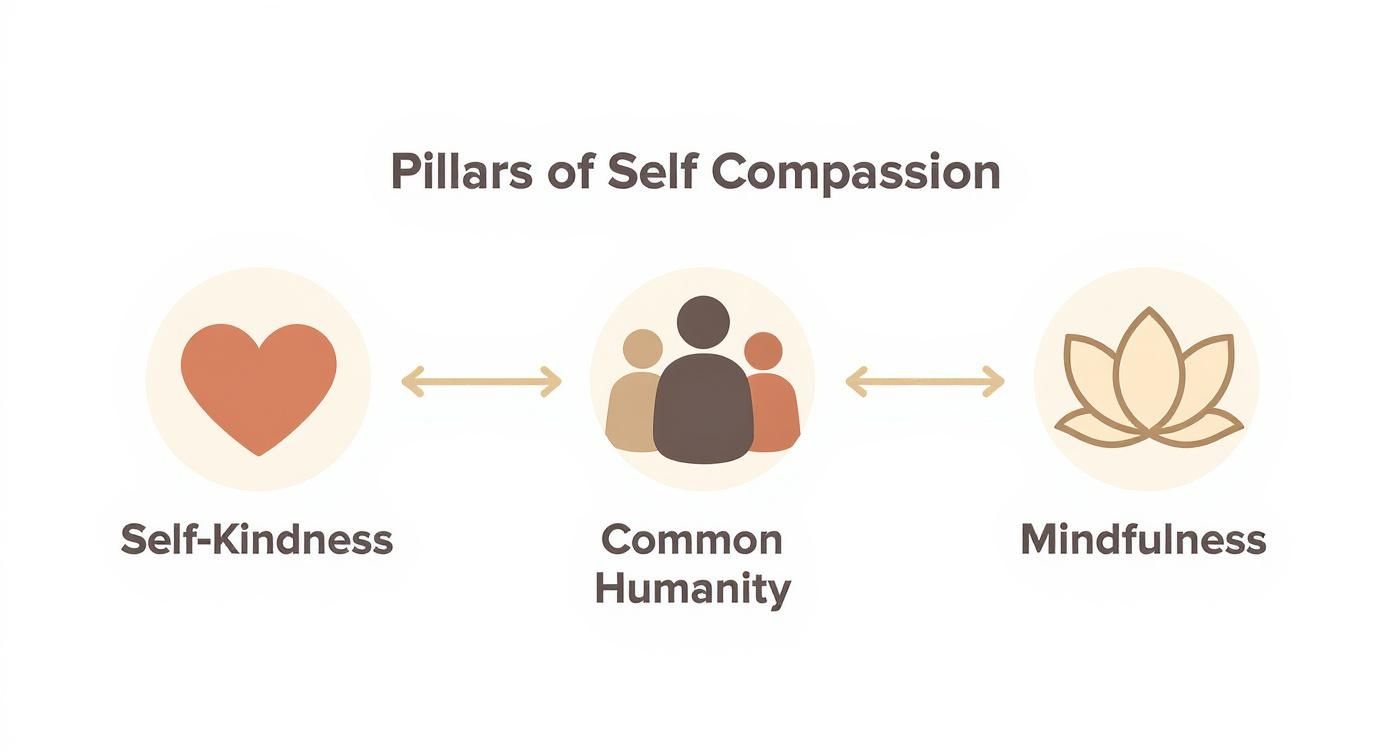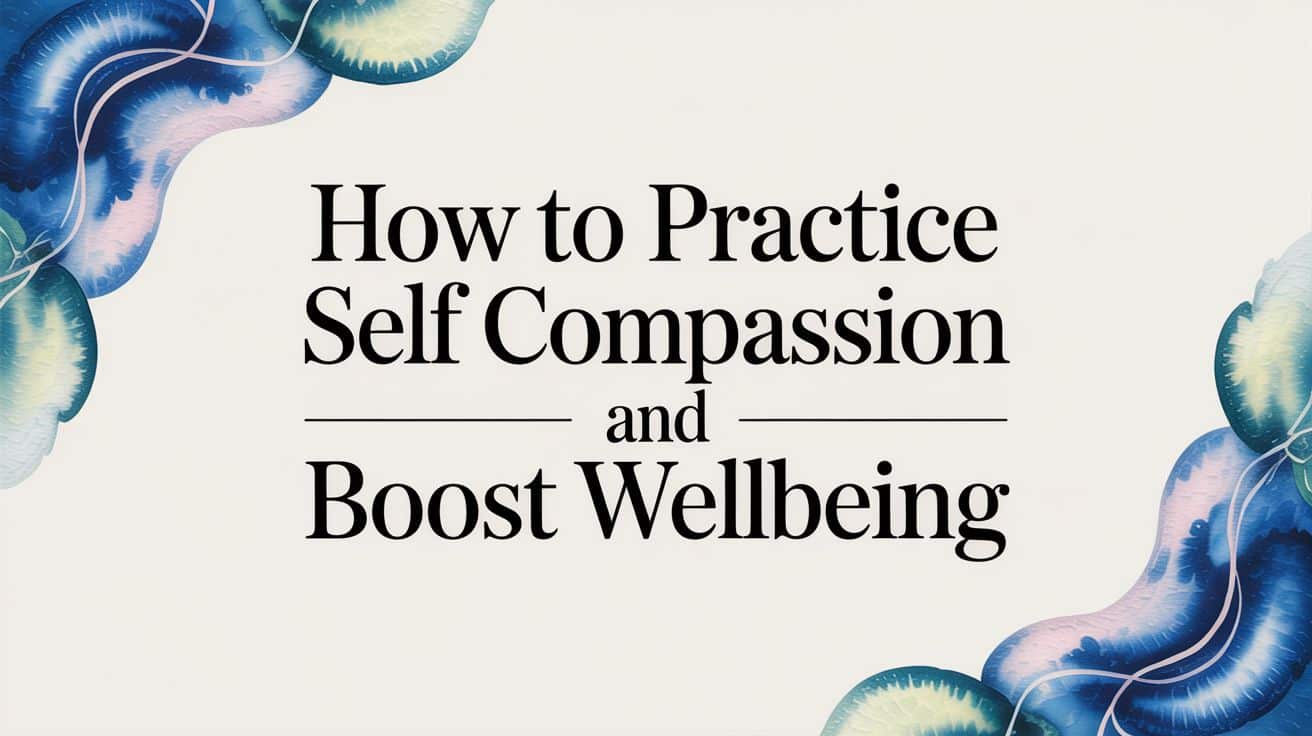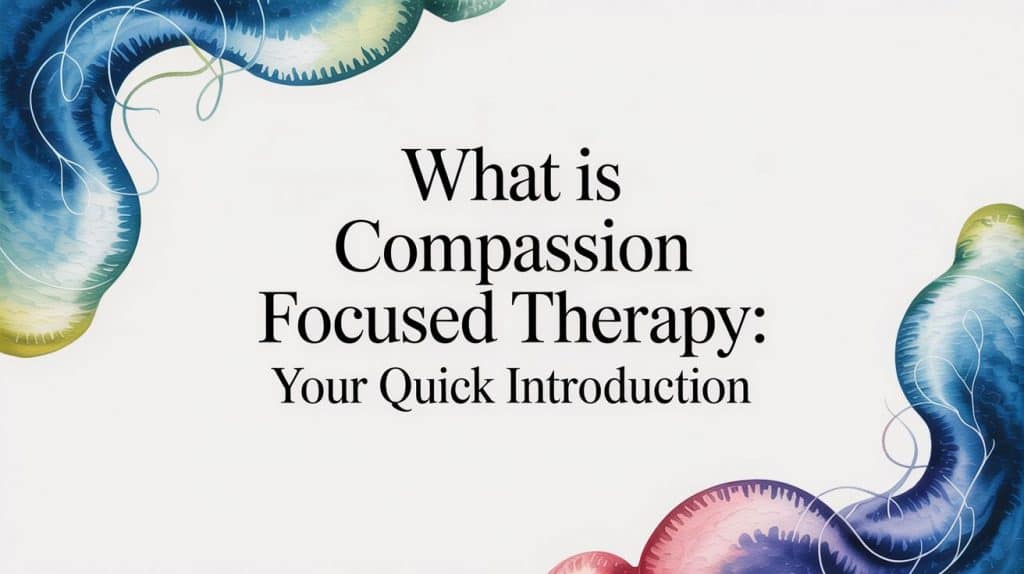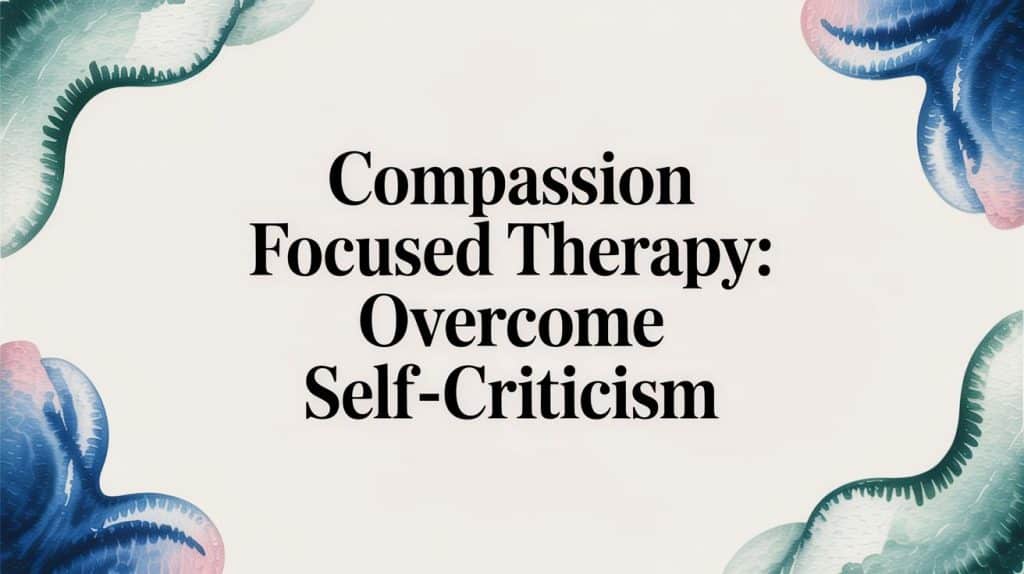When we talk about learning self-compassion, we’re really talking about three things: choosing kindness over judgement, realising that struggle is a shared human experience, and using mindfulness to sit with difficult feelings without letting them take over.
It sounds simple, but it’s a profound shift. At its heart, it’s about treating yourself with the same care and understanding you’d give to a good friend.
What is Self-Compassion and Why Does It Matter?
So many people get self-compassion wrong, mixing it up with self-pity or letting yourself off the hook. In reality, it's one of the most powerful tools we have for building genuine emotional strength and resilience.
Most of us live with a harsh inner critic – that nagging voice that magnifies every mistake and shortcoming. Self-compassion is the antidote.
Instead of beating yourself up for a mistake at work or a personal failing, it invites a different, kinder response. It’s about creating enough space to pause, acknowledge the frustration or pain, and see it for what it is—a difficult moment, not a definition of who you are. This isn’t about avoiding responsibility; it’s about fostering a supportive internal environment where you can actually learn and grow, rather than getting stuck in a cycle of shame.
The Foundation of Emotional Wellbeing
At its core, self-compassion is an active practice of self-support. It means intentionally soothing and comforting yourself when you’re going through a tough time. This can be as simple as placing a hand over your heart during a stressful meeting or consciously shifting your inner monologue from criticism to encouragement.
This practice is built on a few key ideas that work together to create a powerful buffer against life's challenges.
We can break it down into three core pillars. Understanding these is the first step to putting self-compassion into practice in your own life.
The Three Pillars of Self Compassion
| Pillar | What It Means | Shift From → To |
|---|---|---|
| Self-Kindness | Being gentle and understanding with yourself when you fail or feel inadequate, rather than being harsh or critical. | Harsh Self-Criticism → Gentle Self-Support |
| Common Humanity | Recognising that suffering and making mistakes are universal parts of the human experience. You aren't alone in this. | Feeling Isolated → Feeling Connected |
| Mindfulness | Observing your difficult emotions with balance and clarity, without either ignoring them or getting swept away by them. | Over-Identification → Balanced Awareness |
These pillars work in concert to change how we relate to ourselves, especially when we're struggling the most.
"Self-compassion provides the emotional safety needed to acknowledge mistakes and learn from them without being overwhelmed by shame. It fosters a desire for growth from a place of care rather than harsh self-criticism."
This shift in mindset is a game-changer for mental health. The research is incredibly clear and consistent on this point. Extensive evidence from the UK adult population shows a robust link between higher self-compassion and lower levels of depression, anxiety, and stress.
In fact, some studies have shown that a person's baseline level of self-compassion can predict a reduction in negative feelings up to six months later. This highlights its role not just as a feel-good practice, but as a genuine protective factor for our wellbeing. If you want to dive deeper, there is a wealth of fascinating self-compassion research to explore.
By truly understanding what self-compassion is—a blend of kindness, connection, and mindful awareness—we can start building the skills to support ourselves through whatever life throws our way.
Foundational Self Compassion Exercises for Daily Life
It’s one thing to understand the theory behind self-compassion, but the real change happens when we actually start doing it. This is where we move from concept to practice. The goal isn't to add some complicated, time-consuming ritual to your day. It’s about weaving small, potent moments of kindness into the fabric of your life as it’s already happening.
Let's walk through two foundational exercises that are as simple as they are effective. Think of them less as techniques and more as tools for actively reshaping your internal dialogue, especially when you’re in the thick of it. When you learn how to practice self-compassion in the heat of a difficult moment, you begin to build a much more supportive and resilient inner world.
This infographic breaks down the three pillars that form the foundation of these exercises.

As you can see, it's the interplay between self-kindness, a sense of common humanity, and mindfulness that creates a truly compassionate response.
The Self-Compassion Break
The Self-Compassion Break is your in-the-moment rescue tool. It’s a brief, structured exercise designed to be pulled out whenever you notice you're stressed, overwhelmed, or caught in that familiar spiral of self-criticism. It’s like a mental first-aid kit.
Its power really is in its simplicity. You can do it anywhere, anytime, and no one even has to know. It directly activates the three core components of self-compassion, helping you shift from a place of distress to one of mindful self-support.
How to Practise It
The next time a wave of difficult emotion hits—maybe after some critical feedback, or when you’ve made a mistake—give this three-part process a try:
- Acknowledge the Pain (Mindfulness): First, just pause and say to yourself, "This is a moment of suffering." This simple phrase validates your experience without adding any drama or judgement. It's a mindful recognition of what is true in that instant.
- Connect with Humanity (Common Humanity): Next, gently remind yourself, "Suffering is a part of life." This thought connects your personal pain to the universal human experience. It’s a powerful antidote to isolation, reminding you that everyone struggles and you are not alone in how you feel.
- Offer Yourself Kindness (Self-Kindness): Finally, place a hand over your heart or another spot on your body that feels soothing. Feel the warmth and gentle pressure. Then, say to yourself, "May I be kind to myself," or perhaps, "May I give myself the compassion I need."
That physical gesture is surprisingly potent. Gentle, supportive touch can activate the body's care system and calm your physiological stress response. This combination of acknowledging pain, feeling connected, and offering kindness creates a complete, compassionate circuit.
This exercise isn't about fixing the problem; it's about changing your relationship to the pain caused by the problem. It brings you back to a place of balance, allowing you to respond to the situation more thoughtfully.
Compassionate Letter Writing
While the Self-Compassion Break is for immediate relief, Compassionate Letter Writing is a deeper, more reflective practice. It’s a way to consciously cultivate a compassionate inner voice by, funnily enough, externalising it. The exercise involves writing a letter to yourself about something you feel insecure or bad about, but doing so from the perspective of an unconditionally loving and compassionate friend.
This imaginary "friend" embodies all the qualities of compassion: they are wise, kind, accepting, and completely non-judgemental. By stepping into this role, you give yourself permission to access a kinder part of yourself that often gets drowned out by the inner critic.
A Practical Scenario
Imagine you’ve been putting off an important project and now you’re swamped with shame and anxiety. Your inner critic is having a field day, calling you lazy and undisciplined. Here’s how you could use a compassionate letter:
- Acknowledge Your Feelings: Start by just writing down how you feel about the situation, without judging it. "I'm feeling so anxious about this project. I'm really disappointed in myself for procrastinating and now I just feel overwhelmed."
- Embody the Compassionate Friend: Now, shift your perspective. Picture a dear friend who loves you no matter what. What would they say? They wouldn't scold you. They'd most likely offer understanding and support.
- Write from Their Perspective: From that vantage point, write a letter to yourself. It might sound a bit like this:
"My dearest friend, I know how much pressure you're under and it makes total sense that you've been avoiding this. It's a huge task, and feeling overwhelmed is a perfectly normal reaction. Please don't be so hard on yourself. Remember that your worth isn't tied to your productivity. We all struggle with motivation sometimes; it's part of being human. What small step could you take right now just to get started? I’m here for you, no matter what."
The impact of practices like these on wellbeing is well-documented. For instance, in 2022, a study with members of the Pulmonary Hypertension Association UK (PHA UK) found that individuals with greater self-compassion reported fewer mental health difficulties. Those who were highly self-critical experienced more isolation and anxiety, while people who were kind to themselves and accepted struggle as a universal experience had fewer anxiety symptoms. You can explore the full findings about self-compassion and health quality on phauk.org.
After you've written the letter, put it away for a little while. When you come back to it, try to read and absorb the words of kindness and acceptance as if you were receiving them for the first time. This exercise helps train your brain to generate a compassionate response more automatically over time, building a lasting foundation of inner support.
Building Your Resilience Through Self Kindness

It’s a common misconception that self-compassion is a bit of a soft option—a way of letting yourself off the hook when things get tough. But in my experience, the opposite is true. Learning how to practice self-compassion is one of the most powerful ways to build deep, lasting emotional resilience. Think of it as an inner resource that helps you face life’s curveballs, learn from setbacks, and bounce back stronger than before.
Resilience isn't about dodging pain or pretending you never make mistakes. It’s all about how you respond when you inevitably do. A harsh inner critic just breeds fear, making you terrified of failure. Self-kindness, on the other hand, creates a sense of psychological safety. It gives you the space to acknowledge your shortcomings without being completely crushed by them, which is the perfect breeding ground for growth.
This isn't just a nice idea; there's solid research to back it up. One UK-based study on nursing students, for instance, found that both resilience and mental well-being were significant predictors of self-compassion. Interestingly, resilience had the stronger effect, suggesting that as our ability to bounce back increases, so does our capacity for self-kindness. You can dig into the findings yourself and explore the powerful link between resilience and self-compassion in UK nursing students.
From Self-Criticism to Constructive Kindness
Let's walk through a real-world scenario. Imagine you’ve just received some unexpectedly critical feedback from your manager on a project you poured your heart into. The way you handle this moment internally can send you down two very different paths. One path leads to shame and stagnation; the other, to growth and resilience.
A self-critical response tends to personalise the feedback, turning it into a catastrophic failure. Your internal monologue might spin into something like, "I'm so useless. I can never get anything right. Everyone must think I'm incompetent." This kind of thinking doesn't motivate you—it paralyses you. It makes you want to hide, avoid similar projects in the future, and reinforces that deep-seated fear of not being good enough.
But a self-compassionate response creates room to breathe and learn. It starts by simply acknowledging the sting—"Ouch, that's difficult to hear"—and then gently moves toward understanding. This approach helps you see the feedback not as a final judgment on your worth, but as valuable information for improvement.
Self-compassion transforms setbacks from evidence of your failure into opportunities for growth. It silences the fear-driven inner critic and activates a desire to learn and improve out of genuine self-care.
By consciously shifting your internal dialogue, you build the fortitude to handle adversity with far more grace. To see just how this plays out, I've put together a table comparing these two internal responses.
Self-Critical vs. Self-Compassionate Responses to Setbacks
It’s often easier to see the stark difference when we lay these two mindsets side-by-side. Notice how the self-compassionate approach acknowledges the difficulty without letting it define the outcome.
| Situation | Self-Critical Response | Self-Compassionate Response | Likely Outcome |
|---|---|---|---|
| Receiving Tough Feedback at Work | "I'm a failure. I knew I couldn't handle this. Now my boss thinks I'm useless." | "This is tough to hear, and I feel disappointed. It's okay to feel this way. What can I learn from this feedback?" | Self-Critical: Avoidance, anxiety, decreased motivation. Self-Compassionate: Learning, proactive improvement, increased confidence. |
| A Personal Disappointment | "Of course this happened to me. I always mess things up. I'll never achieve my goals." | "This really hurts, and that's understandable. Everyone faces disappointments. What do I need right now to support myself?" | Self-Critical: Rumination, isolation, feeling stuck. Self-Compassionate: Emotional processing, seeking support, finding new paths forward. |
As you can see, the self-compassionate response doesn't ignore the pain. It meets it with kindness, which in turn fuels the motivation to try again. This process is absolutely fundamental to building resilience and truly understanding that self-compassion is the key to emotional well-being and resilience.
By consistently choosing a kinder, more supportive inner voice, you aren't just being nice to yourself. You are actively training your brain to handle stress more effectively, turning life's inevitable challenges into sources of strength rather than shame.
Bumps in the Road: Navigating Common Obstacles in Your Practice

Starting a self-compassion practice is a brave move, but let’s be honest—it’s rarely a smooth, linear journey. If you’ve spent a lifetime operating from a place of harsh self-criticism, trying to switch to a kinder inner dialogue can feel strange, awkward, or even deeply wrong.
That's completely normal. These roadblocks aren't signs you’re doing it wrong; they are an expected, predictable part of the process. Knowing what they are ahead of time means you can navigate them with the very compassion you're trying to build.
Tackling the Feeling of Selfishness
One of the first hurdles I see people stumble over is the nagging belief that self-compassion is selfish. We’re often brought up to believe that being hard on ourselves is the engine of self-improvement and that kindness is just a form of weakness.
This couldn't be further from the truth. Self-compassion isn't about letting yourself off the hook; it's about giving yourself the emotional fuel to meet life's challenges. Think of it as the difference between a supportive coach and a relentless drill sergeant. Both want you to succeed, but only one approach builds sustainable growth without leading to burnout.
To get past this feeling, try a simple reframe:
- See it as self-care, not self-indulgence. You wouldn't call sleeping or eating self-indulgent. Emotional support is just as vital for you to function well.
- Notice the ripple effect on others. When you’re less stressed and more resilient, you're a better friend, partner, and colleague. Your compassion for yourself extends outward.
- Practise for a friend. If offering kindness to yourself feels too foreign, imagine what you would say to a close friend in your exact situation. Then, gently try to offer that same kindness inward.
When Kindness Feels Uncomfortable or Triggers ‘Backdraft’
For some, especially those with a history of trauma or a deeply ingrained inner critic, receiving kindness can feel profoundly unsettling. It’s a phenomenon we sometimes call ‘backdraft’.
Imagine opening a window into a room that’s on fire. The sudden rush of oxygen can make the flames flare up before they die down. The same can happen emotionally. When you offer yourself warmth after a lifetime of internal coldness, it can paradoxically bring old pain, sadness, or grief to the surface. It can feel so unfamiliar that your whole system wants to reject it.
If this happens to you, the key is to be gentle. Go slowly.
"Your goal isn't to force a feeling of warmth, but to create a space of safety. Start small. The simple act of placing a hand on your heart and acknowledging 'this is hard' can be a powerful first step."
This simple, soothing gesture can calm your nervous system without overwhelming it. It’s a physical anchor that communicates care, even if the emotional feeling isn't quite there yet.
Softening the Lifelong Habit of the Inner Critic
That critical voice in your head didn't just show up overnight. It's a well-worn neural pathway, a mental habit reinforced over years, maybe even decades. Trying to shout it down or silence it by force usually just makes it louder.
The compassionate approach is different. It’s about learning to acknowledge the critic's presence without automatically buying into its stories. The goal isn't to eliminate that voice, but to change your relationship with it.
Here are a few ways to start loosening its grip:
- Give it a name. Calling your inner critic 'The Judge' or something a bit silly like 'Nigel' creates distance. It helps you see its commentary as just one part of your mind, not the absolute truth.
- Thank it. I know this sounds strange, but your critic often has a protective (though misguided) intention. It's probably trying to keep you safe from failure or judgment. You can say, "Thank you for trying to protect me. I've got this now."
- Get curious. Instead of fighting the critical thoughts, gently question their validity. Ask yourself, "Is it really 100% true that I am a complete failure because I made this one mistake?"
Working through these obstacles takes patience. Remember, it's a practice, not a perfect performance. For those who find the inner critic is deeply tangled with feelings of shame, understanding that connection can be incredibly freeing. If you'd like to dive deeper, exploring how shame and self-criticism can be addressed with Compassion Focused Therapy offers invaluable insights.
Each time you meet a challenge with gentle awareness instead of frustration, you are strengthening your self-compassion muscle.
Creating a Lasting Self-Compassion Routine
The real magic of self-compassion doesn’t happen in a single, perfectly executed meditation session. It builds up through the small, consistent acts of kindness you offer yourself, day in and day out, especially when life feels messy and imperfect.
The goal isn't to cram another demanding chore onto your to-do list. It’s about gently weaving these practices into the existing rhythm of your life until they feel as natural as breathing.
This isn’t about forcing yourself into a rigid schedule. A lasting routine is flexible, deeply personal, and starts exactly where you are right now. For some, that might look like a five-minute mindful check-in with their morning cuppa. For others, it might be a longer, reflective letter-writing session on a quiet Sunday afternoon. The only thing that matters is finding what genuinely works for you.
Designing Your Personal Practice
The simplest way to build a sustainable habit is to link it to one you already have. This is a technique often called habit stacking, and it brilliantly removes the friction of trying to remember something new. You just piggyback your self-compassion practice onto something you already do automatically.
Think about these as practical starting points:
- Morning Anchor: While you're waiting for the kettle to boil, take three deep, intentional breaths. Use that moment for a quick Self-Compassion Break, acknowledging any worries about the day ahead with kindness.
- Commute Companion: If you take the bus or train, what if you used that time to listen to a guided meditation instead of scrolling through your phone?
- Lunchtime Reset: Just before you eat, take 60 seconds to place a hand on your heart. Notice how you’re feeling—really feeling—and offer yourself a moment of quiet support.
- Evening Wind-Down: As you brush your teeth, think back on one moment today where you were hard on yourself. See if you can reframe it with a kinder perspective.
The idea is to make these moments so small and accessible that it feels easier to do them than to skip them. Consistency trumps intensity, every single time. A one-minute practice done daily will have a far greater impact than a one-hour session done once a month.
Your routine should serve you, not the other way around. If a practice starts to feel like a chore, it’s a sign to adjust it—not to abandon the effort altogether. Self-compassion applies to the practice itself.
Noticing Your Progress Without Keeping Score
So, how do you know if it’s working? The markers of progress in self-compassion are subtle and internal. You won't find them on a chart or a spreadsheet. Instead, you'll start to notice gentle shifts in your inner world.
You might find that the voice of your inner critic, while maybe still there, is a little quieter or somehow less convincing. Or perhaps you’ll notice that when you make a mistake—like spilling coffee all over your desk or missing a deadline—your emotional bounce-back time is shorter. The sting of disappointment just doesn't linger for as long, because you're starting to meet it with understanding instead of harsh judgment.
This internal shift is the true measure of success. It's that growing space between an event and your reaction—a space you begin to fill with warmth and wisdom rather than panic and self-blame.
Staying Motivated for the Long Haul
Let's be realistic: motivation will ebb and flow. On days when it feels difficult or even a bit pointless, remember that this is part of the process. The most compassionate thing you can do is acknowledge that resistance without judging it, and then simply begin again.
If you find yourself consistently struggling to keep a routine going, it might be a sign that you need more structured support. Sometimes, deepening your understanding of the principles behind these exercises can reignite your commitment. For those looking for a more guided path, exploring a structured programme like an 8-week Compassionate Mind Training course can provide the accountability and in-depth learning needed to truly solidify these skills.
Ultimately, creating a lasting routine is an ongoing act of self-kindness. It’s about recognising that you are worthy of your own care, not just on the good days, but especially on the hard ones.
Answering Your Questions About Self-Compassion
As you start to explore what it means to practise self-compassion, it's completely normal for questions and doubts to pop up. For many of us, this is a huge shift away from the self-critical habits we’ve carried around for years, maybe even a lifetime. Let's walk through some of the most common questions that come up on this journey.
Think of this as your first chance to meet your own curiosity with the very kindness you're trying to build. Every single question is valid and a natural part of the learning curve.
Is Self-Compassion the Same as Self-Esteem?
This is a really crucial distinction to make. While they both touch on how we see ourselves, they’re built on entirely different foundations. Self-esteem is often conditional; it tends to shoot up and plummet based on our successes, our failures, and how we think we measure up against others. It can be a bit of a rollercoaster, can't it?
Self-compassion, on the other hand, isn't about judgement or evaluation at all. It’s an unwavering source of kindness you offer yourself simply because you're human and life is hard. It gives you a stable sense of self-worth that isn’t dangling on the string of external validation, making it a much more reliable anchor for your wellbeing, especially when times get tough.
Will Being Self-Compassionate Make Me Lazy or Complacent?
This is probably the most persistent myth about self-compassion, and thankfully, the research points in the exact opposite direction. Harsh self-criticism doesn't motivate; it paralyses. It often breeds a fear of failure that leads directly to procrastination and avoidance. Sound familiar?
Self-compassion actually creates the psychological safety you need to look at your mistakes without being swallowed by shame. This is what allows you to learn from them and, crucially, move forward.
A self-compassionate mindset fosters a genuine desire for growth and wellbeing. It motivates you to make positive changes from a place of care and support, not fear.
Think of it this way: are you more likely to learn and improve with a supportive coach who encourages you after a stumble, or a drill sergeant who screams at you for every single error?
How Long Does It Take to See Benefits from Practising?
The timeline for feeling the benefits is unique to every single person. There’s no set finish line here—this is an ongoing practice, not a one-and-done fix. That said, many people start to notice small but meaningful shifts within just a few weeks of consistent effort.
You might find yourself:
- Catching that inner critic a bit more quickly and choosing not to buy into its harsh story.
- Feeling less overwhelmed by difficult emotions when they arise.
- Responding to small, everyday mistakes with a bit more grace and less frustration.
Bigger changes, like a noticeable boost in emotional resilience or a deeper sense of inner peace, can take several months of dedicated practice. The key is consistency over intensity. Small, regular acts of self-kindness build on each other over time. Remember, being patient with the process is, in itself, a profound act of self-compassion.
Can I Practise Self-Compassion If I Feel Undeserving?
Yes, absolutely. In fact, feeling unworthy is often the very reason self-compassion is so desperately needed. The practice isn't about waiting until you feel you've finally "earned" kindness. It's about offering it unconditionally, especially in those moments when you feel you deserve it the least.
If connecting with the emotional side of it feels too big of a leap at first, just start with the mechanics. You don't have to feel a sudden wave of warmth to begin. Simply going through the motions of a practice like the Self-Compassion Break—placing a hand on your heart, speaking kind words to yourself—can start to forge new neural pathways. The action can come first; over time, the genuine feeling of deservingness often follows.
If you find that deep-seated patterns of self-criticism are making it difficult to move forward, working with a professional can provide invaluable support. At Dr Chris Irons, I offer compassionate, evidence-based therapy and coaching to help you build a kinder, more resilient relationship with yourself. Explore how we can work together at https://drchrisirons.com.


